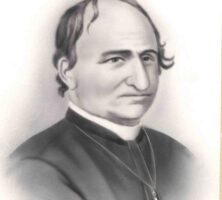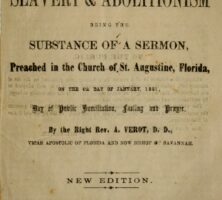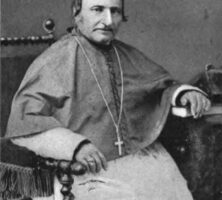As the third Roman Catholic Bishop of the Diocese of Savannah, a position he held between 1861 and 1870, Augustin Verot guided the diocese through the turbulent years of the Civil War (1861-65) and Reconstruction (1867-76).
Augustin Verot was born on May 23, 1805, in Le Puy, France, to Magdeleine Marcet and Jean Pierre Augustin Marcellin Verot. When he was sixteen, he decided to become a priest and attended the Sulpician seminary in Paris. In 1828 he was ordained and soon thereafter joined the Sulpicians, a society of priests dedicated to training young men of the altar. In 1830 he was sent to Baltimore, Maryland, to teach at St. Mary’s College. There, he taught philosophy, science, and math. After St. Mary’s closed its doors in 1852, Verot served as a parish priest at Ellicott’s Mills, Maryland. In 1857 Pope Pius IX appointed Verot as the vicar apostolic of St. Augustine, Florida. With only a handful of priests statewide and few religious institutions, the post carried significant challenges. With support from his native France, however, Verot raised funds to build and repair churches, to establish new schools, and to recruit religious communities to staff schools and churches.

On July 16, 1861, Verot was named the third bishop of Savannah, a see that had been vacant since 1859. (Though he was transferred to Savannah, he simultaneously kept his vicarial powers over Florida.) On January 4, 1861, during the secession crisis, and just before his move to Georgia, Verot preached a sermon that was subsequently published and distributed throughout the South as a Confederate tract. The sermon’s wide circulation earned him national recognition, and Verot came to be known as the “Rebel Bishop” by many in the North. In the sermon, he defended the institution of slavery and condemned abolitionists who branded slavery a moral evil. However, many southerners ignored the second half of the sermon in which Verot laid out the conditions under which slavery was lawful and just. These conditions included limitations on the sale of enslaved people, the right of enslaved men and woman to marry, and support for African Americans who wished to practice their faith.

During the war years, Verot defended his position on slavery and his support of the Confederacy. Nevertheless, he also advocated for the spiritual welfare of both Union and Confederate soldiers within his jurisdiction. To this end, he supplied chaplains to the armed forces and even appointed two Catholic priests to serve Union prisoners at Andersonville. In addition, he personally ministered to soldiers at camps that fell on the path of his diocesan tours.
After the war, Verot’s attentions focused on rebuilding churches damaged during the conflict. He also ministered to the many newly freed African Americans within his jurisdictions. In 1866 he issued a pastoral letter that called upon southern Catholics to put away prejudice against formerly enslaved people and to work toward elevating the welfare of freedmen. Shortly thereafter, he attended the Second Plenary Council at Baltimore, where he urged his fellow bishops to provide funding and resources for Black schools and churches.

While Verot oversaw the opening of several such schools and churches, these efforts ultimately proved unsuccessful due to poor organization, lack of will, strong opposition by Protestants, and the lack of independent African American Catholic priests and churches. The Freedmen’s Bureau and northern philanthropists ultimately assumed control over those schools. Verot’s campaign to obtain public support for church-affiliated schools in Savannah proved more successful. After several years of debate and negotiations, Verot and the Diocese of Savannah successfully reached an agreement with the city that allowed Catholic parochial schools to receive public funds to teach Catholic children, an arrangement that lasted until 1917.
Verot’s time as bishop of Savannah ended in 1870, when the Florida vicariate was elevated to a diocese, and he was appointed the first bishop of St. Augustine. He would remain in Florida until his death on June 10, 1876.








